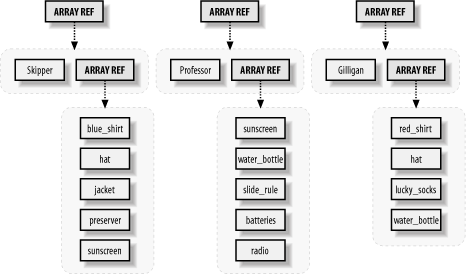
3.6. Nested Data Structures
In this example, the array @_ contains two elements, one of which is also an array. What if you take a reference to an array that also contains a reference to an array? You end up with a complex data structure, which can be quite useful.
For example, iterate over the data for the Skipper, Gilligan, and the Professor by first building a larger data structure holding the entire list of provision lists:
my @skipper = qw(blue_shirt hat jacket preserver sunscreen);
my @skipper_with_name = ("Skipper", \@skipper);
my @professor = qw(sunscreen water_bottle slide_rule batteries radio);
my @professor_with_name = ("Professor", \@professor);
my @gilligan = qw(red_shirt hat lucky_socks water_bottle);
my @gilligan_with_name = ("Gilligan", \@gilligan);At this point, @skipper_with_name has two elements, the second of which is an array reference, similar to what was passed to the subroutine. Now group them all:
my @all_with_names = ( \@skipper_with_name, \@professor_with_name, \@gilligan_with_name, );
Note that you have just three elements, each of which is a reference to an array, each of which has two elements: the name and its corresponding initial provisions. A picture of that is in Figure 3-1.

Figure 3-1. The array @all_with_names holds a multilevel data structure containing strings and references to arrays
Therefore, $all_with_names[2] will be the array reference for the Gilligan's data. If you dereference it as @{$all_with_names[2]}, you get a two-element array, "Gilligan" and another array reference.
How would you access that array reference? Using your rules again, it's ${$all_with_names[2]}[1]. In other words, taking $all_with_names[2], you dereference it in an expression that would be something like $DUMMY[1] as an ordinary array, so you'll place {$all_with_names[2]} in place of DUMMY.
How do you call the existing check_required_items( ) with this data structure? The following code is easy enough.
for my $person (@all_with_names) {
my $who = $$person[0];
my $provisions_reference = $$person[1];
check_required_items($who, $provisions_reference);
}This requires no changes to the subroutine. $person will be each of $all_with_names[0], $all_with_names[1], and $all_with_names[2], as the loop progresses. When you dereference $$person[0], you get "Skipper," "Professor," and "Gilligan," respectively. $$person[1] is the corresponding array reference of provisions for that person.
Of course, you can shortcut this as well, since the entire dereferenced array matches the argument list precisely:
for my $person (@all_with_names) {
check_required_items(@$person);
}or even:
check_required_items(@$_) for @all_with_names;
As you can see, various levels of optimization can lead to obfuscation. Be sure to consider where your head will be a month from now when you have to reread your own code. If that's not enough, consider the new person who takes over your job after you have left.

Copyright © 2003 O'Reilly & Associates. All rights reserved.



